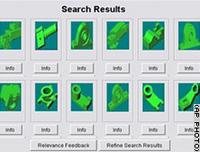 CNN mentions researchers working on making a search engine that can search for pictures that are similar to something you're looking for. More impressively, they can do that with 3D objects too. CNN mentions researchers working on making a search engine that can search for pictures that are similar to something you're looking for. More impressively, they can do that with 3D objects too.Draw a big potato, and the system responds with a bunch of, well, potato-looking objects -- and a few urns. Those seem wrong until you rotate your potato, orienting it vertically instead of horizontally, and see your sketch actually does resemble an urn, narrow on top and bottom and bulging in the middle. That's cool and useful. And, to expand the idea a bit, we need many more ways of getting beyond words. There are many useful things we might want to search for that are more based on a pattern than on a set of key words. We can search very well for keywords now, and even get good and useful results quickly. My wife asked me to find out which country was the first to introduce equal voting rights for women. It took me about 10 seconds and the answer was in the first match in google. (The answer is New Zealand, in 1893, shortly followed by Holland). But I don't have good ways of searching for information that is either more fuzzy, or that is a pattern or constellation of other complex pieces of information. Like, a group of people suited for a certain type of project. Or a past project that successfully functioned in some manner I'm interested in, but in a different field than I have in mind. Or some data that would match a certain scenario I have in mind. Situations where the diagram might look similar, but the content is different, and the different content and the complexity means that a keyword search wouldn't help much. Neither would a picture search, as there might not be any graphicsl representations and there's no guarantee they will look similar, even if they have similar structure.
[ Knowledge | 2004-04-19 12:52 | | PermaLink ] More >
|
 Via Local Thoughts, a little creative exercise:
Via Local Thoughts, a little creative exercise: CNN mentions researchers working on making a search engine that can search for pictures that are similar to something you're looking for. More impressively, they can do that with 3D objects too.
CNN mentions researchers working on making a search engine that can search for pictures that are similar to something you're looking for. More impressively, they can do that with 3D objects too.